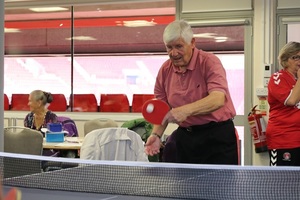Social prescribing: new national academy set up
The academy will help more people benefit from arts, sport and leisure activities across the country.

Health and Social Care Secretary Matt Hancock is setting out his ambition for every patient in the country to have access to social prescribing schemes on the NHS as readily as they do medical care.
Social prescribing involves helping patients to improve their health, wellbeing and social welfare by connecting them to community services. This can include activities such as art and singing classes.
The National Academy for Social Prescribing will work to:
- standardise the quality and range of social prescribing available to patients across the country
- increase awareness of the benefits of social prescribing by building and promoting the evidence base
- develop and share best practice, as well as looking at new models and sources for funding
- bring together all partners from health, housing and local government with arts, culture and sporting organisations to maximise the role of social prescribing
- focus on developing training and accreditation across sectors
The indepedent academy will receive £5 million of government funding and will be led by Professor Helen Stokes-Lampard, the outgoing Chair of the Royal College of General Practitioners.
It has been developed in partnership across government, with Sport England, Arts Council England and a range of voluntary sector partners.
Alongside the benefits for patients, the National Academy for Social Prescribing could reduce the burden on the NHS.
Only 60% of Clinical Commissioning Groups (CCGs) use social prescribing for patients with anxiety, mental health problems and dementia.
In some parts of the country, patients with long-term conditions who have had access to social prescribing link workers have said they are less isolated, attended 47% fewer hospital appointments and made 38% fewer visits to A&E.
The NHS Long Term Plan includes plans to recruit over 1,000 trained social prescribing link workers by 2020 to 2021, with the aim of 900,000 people being referred to social prescribing schemes by then.
The government’s Loneliness Strategy committed to every eligible patient in the country having access to a social prescribing connector scheme by 2023.
Health and Social Care Secretary Matt Hancock said:
This academy is much more important than any one individual. It’s about all of us in health, arts, culture, sport, communities coming together around one simple principle: that prevention is better than cure
Social prescribing is a huge part of this. There are thousands of people up and down the country right now who are already benefiting from activities like reading circles, choir groups and walking football.
The National Academy for Social Prescribing will act as a catalyst to bring together the excellent work already being done across the NHS and beyond, building on our NHS Long Term Plan’s ambition to get over 2.5 million more people benefitting from personalised care within the next 5 years.
Professor Helen Stokes-Lampard said:
I’m thrilled to have been appointed as chair of this new academy. Social prescribing has always been so close to my heart as a practising GP. It’s what good GPs have always done in terms of getting the best help and support for our patients beyond the medicines we also provide them with.
I’m looking forward to starting work with colleagues from so many sectors to bring social prescribing into the mainstream, to train and educate social prescribers of the future and to establish a great evidence base and raise the profile of this fantastic initiative.
Nicky Morgan, Secretary of State for Digital, Culture, Media and Sport, said:
The arts, culture, libraries, sport and voluntary sectors enrich so many of our lives every single day. So I am delighted that we are launching The National Academy for Social Prescribing, building upon the ambitious plans outlined in the Loneliness Strategy last year.
Social prescribing can help bring communities together and reduce feelings of isolation. By referring people to activities suitable for them we can boost people’s confidence and improve their mental and physical wellbeing.